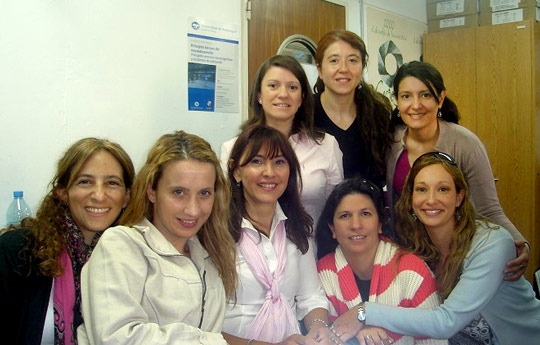SOCIAL SCIENCES AND HUMANITIES
Scientists treat cognitive dysfunctions to improve school performance
Researchers at the INCIHUSA in Mendoza resort to playful activities to enhance student’s learning at primary school
Cognitive control functions or executive functions are essential abilities that intervene in the intellectual development and are indispensable for the proper development of individuals along their lives.
Some primary school children have certain difficulties in those mental processes, which intervene in the reception, selection, transformation, storage, production and recovery of information.
Attention, memory and interpersonal conflict resolution are some of the functions that, as in the rest of human behaviour, are developed in the social sphere are the result of the interaction between individuals, and among them, their contexts.
One of the lines of research of the Evolutionary and Educational Psychology Group of the Institute of Social and Environmental Human Sciences (INCIHUSA-CONICET) consists in the detection and early treatment of certain difficulties in the socio-cognitive working and their implications on school performance.
Mirta Ison, indendent researcher at the CONICET and leader of the team, explains that the Programa de intervención de funciones socio-cognitivas [Intervention Programme of socio-cognitive functions] aims to determine the causes of these dysfunctions through an elaborate plan of action, and implement some strategies to find a solution: “we worked with public schools in the province, specially those ones characterized as urban-marginal. First we assess the cognitive capacities of the children and if we identify cases in which those capacities are lower that expected for their chronological age, we offer the implementation of an action programme involving the stimulation of these functions in order to foster their development. After that, we compare the function before and after the programme to analyse the effectiveness of the programme”, the researcher describes.
The experience in the fieldwork allowed them to determine that those children whose family contexts have the greatest degree of difficulties in emotional regulation and cognitive control functions. Ison highlights that the students have complex family contexts, and do not receive the adequate support from their parents in the growing process and development are likely to have those kinds of problems. “When the child does not have the stimulation of a family who encourages him or her to be curious, to play or to read, we realized that the cognitive control functions are lower than expected”, she explains.
The researcher states that the environment where the individuals develop is vital for the ideal development of those capacities. “It does not mean that the children do not have that capacity, but they need certain conditions to allow and encourage their development”, she adds.
Through the intervention programme of socio-cognitive functions, the evolutionary and educationally psychology team uses different tools to detect and treat those students who have difficulties regarding their cognitive levels and social integration. “The intervention programme involves the use of cognitive functions and that is performed through playful activities that stimulate children’s attention, memory, cognitive flexibility and interpersonal relationships”.
It provides for the active participation of the teachers and the family. Besides, it promotes the support of the school and the family, what helps children to have better performance than those who do not have it.
The researcher states that 80 per cent of the students who participated in this type of training managed to improve these functions.
They are not hopeless cases
Ison explains that there are ideal periods for the development these functions. Those children who during the first years of life have more difficulties in their executive functions need more support to achieve an ideal development of those ones. Furthermore, she comments that “most probably, that kid is going to have more problems to develop, especially in high school where more abilities are required. In general, they are teenagers who are likely to drop out school, start again and drop out systematically, have high levels of frustration. So, at the slightest inconvenient with their tasks, they do not finish them, and they are exposed different problems. A teenager without the support of adults is prone to develop complicated behaviour”.
Likewise, the researcher states that the young people who during their childhood did not have enough stimulation for the development of those abilities can recover and improve their cognitive functions with proper support.
- By Leonardo González. CCT Mendoza.
- About the research
- Mirta Ison. Independent researcher. INCIHUSA.
- • Gabriela Morelato. Assistant researcher. INCIHUSA.
- • Carolina Greco. Assistant researcher. INCIHUSA.
- • Celina Korzeniowski. Posdoctoral fellow. INCIHUSA.
- • Celeste Daher. Doctoral fellow. INCIHUSA.
- • Leandro Casari. Doctoral fellow. INCIHUSA.
- • Mariana Carrada. Universidad del Aconcagua.
- • Silvina Maddio. Universidad del Aconcagua.
- • Cecilia Moreno. Universidad Aconcagua and Catholic University of Argentina.
